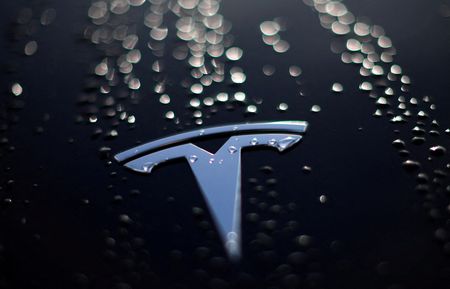(Reuters) – Shares of Tesla fell about 5% on Monday after key supplier Panasonic Holdings said it cut automotive battery production in the September quarter, cementing concerns of a global slowdown in electric-vehicle (EV) sales.
Panasonic said its production suffered from slowing uptake for high-end EVs in North America, echoing Tesla CEO Elon Musk’s comments from earlier this month that higher-for-longer borrowing costs would take a toll on vehicle demand.
“Panasonic’s warning of soft demand for Tesla’s Model S and Model X cars has many concerned that global economic outlook could be in worse-shape than initially believed,” said Edward Moya, senior market analyst at Oanda.
Earlier on Monday, General Motors reached a tentative deal with the United Auto Workers union, following deals by Ford Motor and Chrysler-owner Stellantis, and potentially putting an end to disruptions that some analysts had said could have given Tesla an edge.
Since the UAW strike began, Tesla shares have, however, fallen 34% compared with a 30% to 33% decline in shares of Ford Motor and General Motors, and a 33% rise in Stellantis’s shares.
Tesla investor Gary Black attributed the weakness in Tesla shares to chipmaker Onsemi’s bleak forecast.
“ON sells to automotive players with over 50% share of global EV sales, including 4 of the top 5 China EV makers,” he said in a post on social media platform X on Monday.
Onsemi CEO Hassane El-Khoury said the company’s top European clients were working to clear their inventory and noted that the company sees “increasing risk to automotive demand due to high interest rates.”
Weak demand will mount more pressure on Tesla’s gross margin. It contracted to 17.9% between July and September from 25.1% a year earlier due the EV maker’s rampant price cuts, which also triggered a price war in key markets such as China.
Tesla was trading at about 56 times its 12-month forward earnings estimates, compared with 5.6 times for Ford and General Motors’ 4.1, according to LSEG data.
(Reporting by Chavi Mehta in Bengaluru; Additional reporting by Akash Sriram in Bengaluru; Editing by Shinjini Ganguli)

